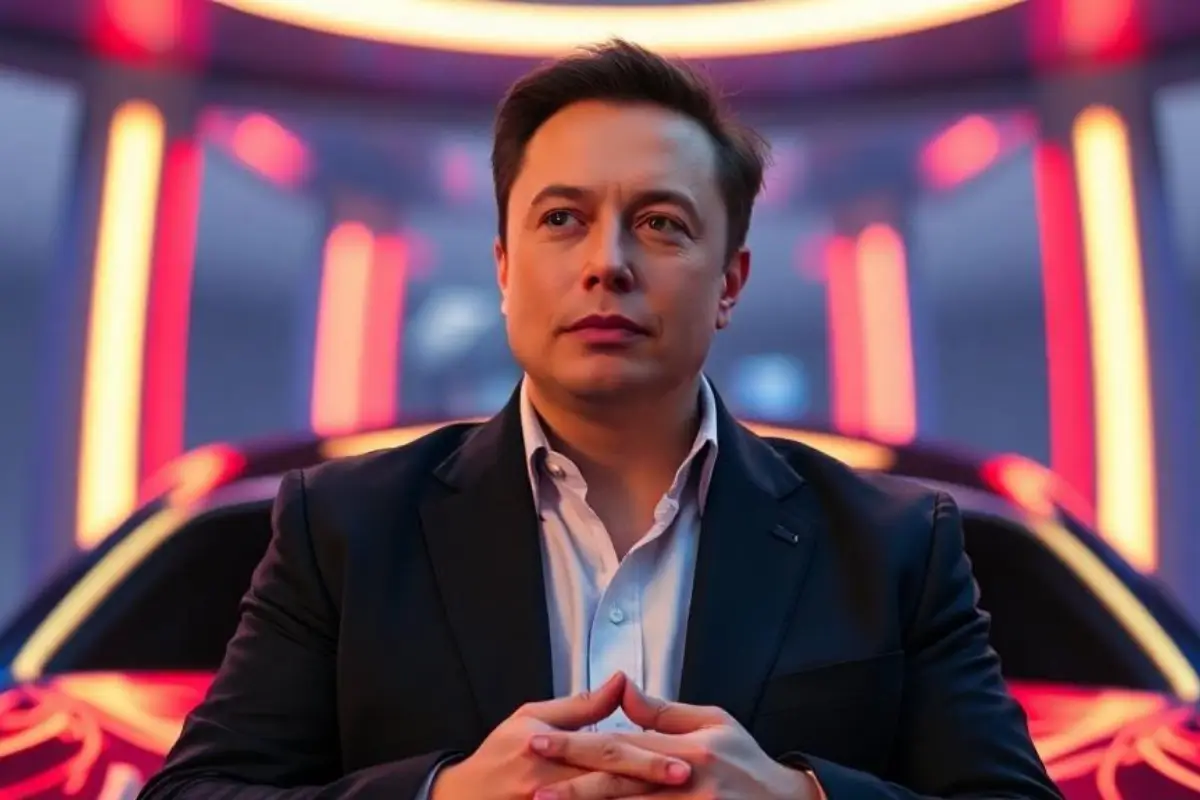Who is elon musk and why do his companies matter?
Elon Musk is more than just a billionaire; he’s a visionary entrepreneur who has redefined innovation across multiple industries.
As the CEO of Tesla and SpaceX, and founder of groundbreaking companies like Neuralink and The Boring Company, Musk consistently pushes the boundaries of technology.
From electric vehicles to space exploration, his ventures aim to solve some of humanity’s most pressing challenges.
Musk’s companies matter because they’re not just businesses—they’re catalysts for global change.
Tesla accelerates the shift to sustainable energy, while SpaceX pioneers interplanetary exploration.
Neuralink is advancing brain-machine interfaces, and The Boring Company is reshaping urban transportation.
For the U.S. nerd audience, Musk embodies the ultimate innovator archetype, blending bold ideas with a relentless drive to turn science fiction into reality.
This article will explore his companies, their missions, and how they’re shaping the future.
By the end, you’ll discover what makes each one uniquely impactful and how they connect to Elon Musk’s overarching vision for humanity.
So, what are Elon Musk’s companies, and how are they revolutionizing the world? Let’s dive in.
1. Why are people fascinated by musk companies?
Musks companies have captured the imaginations of millions worldwide, particularly in the tech and nerd communities.
His influence on the technology sector is undeniable, as he consistently introduces groundbreaking ideas that challenge conventional thinking.
From revolutionizing electric vehicles with Tesla to making private space travel a reality through SpaceX, Musk has established himself as a key figure at the forefront of innovation.
One of the primary reasons people are so fascinated by Musk’s ventures is his ability to tap into future-centric industries that nerds and tech enthusiasts are passionate about.
Space exploration is a hot topic, especially with Musk’s vision of a sustainable, multi-planetary future.
SpaceX’s missions, including the Starship project aimed at Mars, inspire excitement among those who’ve long dreamed of interplanetary travel.
Musk’s company has also successfully launched reusable rockets, reducing the costs of space exploration, making it accessible to new players and fostering excitement in the tech community.
Then, there’s electric vehicles and sustainable energy—two themes that resonate deeply with today’s environmentally conscious generation.
Tesla’s mission to accelerate the world’s transition to sustainable energy connects with a growing need for more eco-friendly technology.
The sleek design, impressive range, and autonomous capabilities of Tesla vehicles appeal to both car enthusiasts and those concerned with reducing their carbon footprints.
Tesla’s role in reshaping the automotive industry is constantly discussed in tech circles, fueling both curiosity and admiration.
Musk’s focus on artificial intelligence (AI) with Neuralink, designed to develop brain-machine interfaces, is another reason why people are captivated by his work.
AI and human augmentation are central topics in nerd culture, often discussed in science fiction but slowly becoming a reality under Musk’s leadership.
Neuralink aims to enhance human cognitive abilities and treat neurological diseases, pushing the boundaries of human-machine synergy.
In essence, Musk’s companies are a perfect fit for nerd culture because they embody futuristic goals that resonate with tech enthusiasts’ interests.
Whether it’s space, electric vehicles, AI, or sustainable energy, Musk is constantly breaking barriers in ways that connect deeply with the dreams of a tech-driven future.
His ability to innovate in industries that were once thought to be beyond reach makes his ventures highly compelling and endlessly fascinating to those who envision a world where technology enhances every aspect of our lives.
2. Elon musk’s companies: an overview
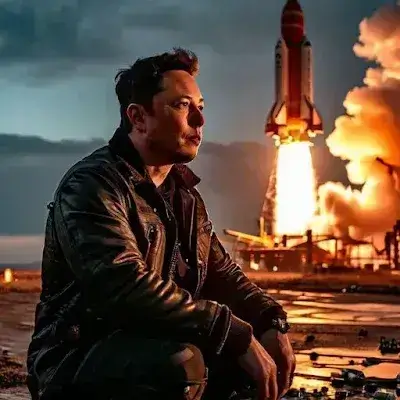
Elon Musk is not just a visionary entrepreneur; he’s a disruptor who has transformed multiple industries.
His companies have become synonymous with cutting-edge technology, innovation, and the future.
Here’s an overview of Elon Musk’s companies, each playing a significant role in reshaping the world as we know it.
2.1 What are Elon Musk’s companies?
Elon Musk’s portfolio includes a wide range of companies, each targeting different sectors of technology and beyond.
Let’s take a closer look at his most notable ventures:
Tesla, Inc.
Founded in 2003, Tesla is Musk’s most prominent company and a leader in electric vehicles (EVs).
With a mission to accelerate the world’s transition to sustainable energy, Tesla has not only revolutionized the automotive industry with its sleek, high-performance electric cars but has also branched into energy storage solutions and solar products.
Tesla’s commitment to reducing global carbon emissions continues to drive the company’s innovation and global influence.
SpaceX
Founded in 2002, SpaceX is Musk’s ambitious endeavor to make space travel affordable and accessible.
The company’s groundbreaking achievements include the development of the Falcon 1, Falcon 9, and Starship rockets, as well as the Dragon spacecraft, which is used to deliver cargo to the International Space Station.
Musk’s ultimate goal with SpaceX is to colonize Mars, ensuring humanity’s long-term survival.
SpaceX is also advancing the idea of reusable rockets, drastically reducing the cost of space travel.
Neuralink
Founded in 2016, Neuralink focuses on developing brain-machine interfaces (BMIs).
With its ambitious goal to bridge the gap between the human brain and artificial intelligence, Neuralink aims to treat neurological diseases and enhance human cognitive abilities.
Through groundbreaking technologies, Neuralink envisions a future where humans can interact with computers directly through thought alone, opening the door to possibilities once thought impossible.
The Boring Company
Founded in 2016, The Boring Company aims to address urban transportation challenges by developing underground tunnels for faster, more efficient travel.
The company’s Loop system uses electric vehicles traveling through tunnels to reduce traffic congestion and provide high-speed transit options.
Musk’s vision of transforming cities and addressing growing urbanization is encapsulated in The Boring Company’s mission.
X.com and PayPal (Past)
Before launching his more recent ventures, Musk co-founded X.com, an online payment company, in 1999.
The company eventually became PayPal, which was sold to eBay in 2002 for $1.5 billion.
This was Musk’s first major success, and it paved the way for his future ventures.
PayPal revolutionized digital payments, and Musk’s role in its development laid the foundation for his reputation as a tech entrepreneur with a knack for disruptive innovation.
Quick facts:
- Tesla, Inc.
- Founded: 2003
- Mission: Accelerate the world’s transition to sustainable energy
- Products: Electric vehicles, energy storage, solar products
- SpaceX
- Founded: 2002
- Mission: Make space travel affordable and help humanity colonize Mars
- Achievements: Reusable rockets, private space exploration
- Neuralink
- Founded: 2016
- Mission: Develop brain-machine interfaces to treat neurological diseases and enhance human intelligence
- Focus: Human-AI interaction, cognitive enhancement
- The Boring Company
- Founded: 2016
- Mission: Solve traffic problems with underground transportation systems
- Projects: Loop transit systems, underground tunnels
- X.com and PayPal
- Founded: 1999 (X.com)
- Mission: Revolutionize online payments
- Achievement: PayPal acquisition by eBay for $1.5 billion
3. How do musk companies work together?
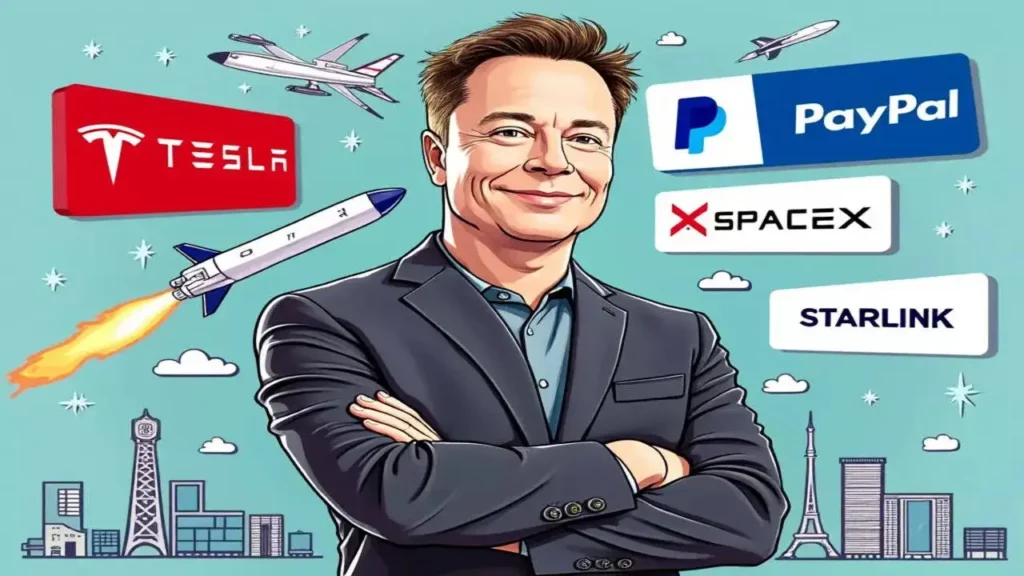
Elon Musk’s companies are not just isolated ventures; they are part of a larger ecosystem where innovation and sustainability are at the forefront.
Each company has its unique focus, but they all share a common vision: to build a sustainable future and make humanity multi-planetary.
The synergy between Musk’s companies, such as SpaceX and Tesla, exemplifies how technology, energy, and transportation intersect to create a better tomorrow.
Complementary Innovation: SpaceX and Tesla
One of the most prominent examples of synergy between Musk’s companies is the shared innovation ethos that drives both SpaceX and Tesla.
While Tesla focuses on revolutionizing electric vehicles and sustainable energy solutions, SpaceX is dedicated to making space travel more affordable and achievable.
Both companies are on the cutting edge of technology and engineering, pushing the boundaries of what’s possible in their respective fields.
Tesla’s advancements in electric vehicle (EV) technology complement SpaceX’s needs for sustainable power.
For instance, SpaceX is increasingly relying on renewable energy for its operations.
Tesla’s solar panels and Powerwall battery storage systems can be used to power SpaceX’s rocket facilities, further aligning the two companies’ goals of reducing dependence on fossil fuels.
By integrating Tesla’s solar solutions into SpaceX’s launch sites, Musk is ensuring that the space exploration company operates in an environmentally responsible manner.
Sustainable Energy as a Core Principle
The connection between Tesla and SpaceX goes beyond just technology; it’s deeply rooted in Musk’s overarching vision for a sustainable future.
Tesla’s push for solar energy and energy storage, coupled with SpaceX’s drive to make humanity a multi-planetary species, are not just mutually beneficial—they are interdependent.
For example, while Tesla makes electric vehicles that rely on green energy, SpaceX‘s goal of establishing human colonies on Mars demands sustainable energy sources.
The idea is that by pioneering sustainable technologies here on Earth, Musk is preparing humanity to thrive on other planets, where renewable energy will be just as critical.
This is why SpaceX is keen on using Tesla’s solar technology for powering the Mars colonies Musk envisions in the future.
The Overarching Goal: A Multi-Planetary Future
Musk’s ambition doesn’t stop at Earth.
His companies are working together toward a common goal: the colonization of Mars and the creation of a multi-planetary civilization.
The need for a sustainable future on Earth is directly tied to the success of this vision.
SpaceX aims to build a self-sustaining city on Mars, and this requires a clean energy infrastructure to support the new human settlements.
Tesla’s efforts in developing renewable energy systems—solar power, energy storage, and electric vehicles—are directly aligned with SpaceX’s goal to use these same technologies on Mars.
As Earth continues to evolve toward renewable energy, the technologies that Tesla and SpaceX develop here on Earth will serve as the foundation for Mars’ colonization, supporting Musk’s long-term vision of a multi-planetary society.
Conclusion
By integrating cutting-edge technologies from SpaceX and Tesla, Elon Musk is shaping a future where humanity can thrive in a sustainable and interplanetary world.
Through shared innovation and a common mission of reducing humanity’s carbon footprint, Musk’s companies are leading the way in creating a greener, more sustainable, and multi-planetary future.
From the energy solutions that power electric cars to the rockets that carry humanity to other planets, Musk’s vision is slowly but surely becoming a reality.
4. Deep dive into each company
Elon Musk’s companies span multiple industries, each with its own set of revolutionary technologies and ambitions.
To understand the full scope of his impact, let’s take a deeper look into each one, focusing on their innovations, missions, and how they’re changing the world.
Tesla: Accelerating the Transition to Sustainable Energy
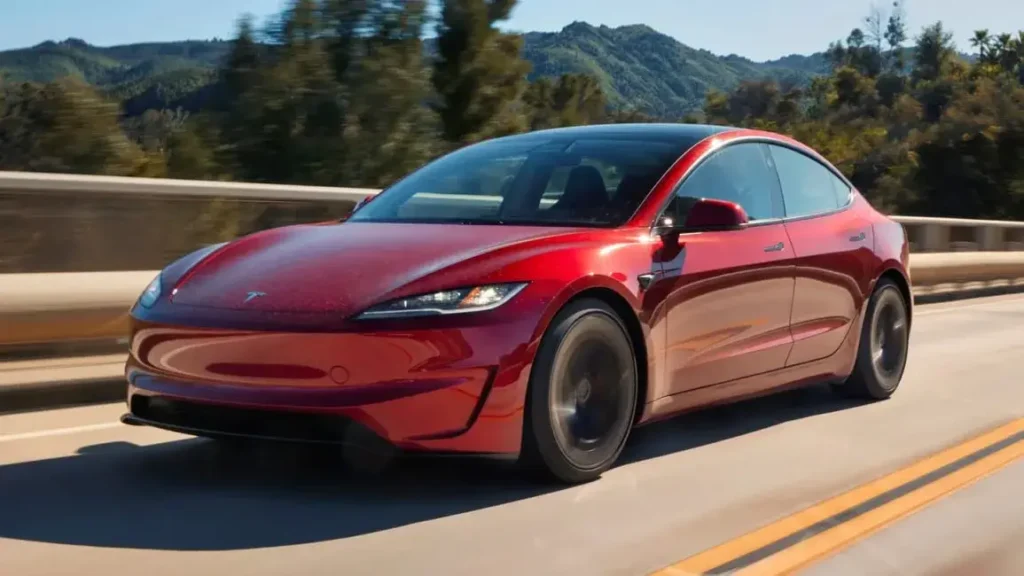
Tesla, founded in 2003, is arguably the most well-known of Musk’s ventures.
With a mission to accelerate the world’s transition to sustainable energy, Tesla has redefined what electric vehicles (EVs) can do.
The company started with the Roadster, an all-electric sports car, and has since expanded to produce affordable, high-performance vehicles like the Model 3 and Model Y.
But Tesla’s impact goes beyond electric cars.
Energy Products:
Tesla’s Powerwall and Solar Roof aim to revolutionize energy consumption.
The Powerwall is a home battery system that stores solar energy, allowing homeowners to go off-grid.
The Solar Roof replaces traditional roofing with solar panels, turning every home into a potential energy producer.
Nerd Angle – Autopilot and AI:
One of the most exciting aspects of Tesla’s mission is its Autopilot system, which uses AI and machine learning to enable semi-autonomous driving.
Tesla cars are equipped with sensors, cameras, and software that allow them to recognize road signs, detect obstacles, and even park themselves.
This integration of AI with electric vehicles is pushing the boundaries of what autonomous driving can achieve.
SpaceX: Making Life Multiplanetary
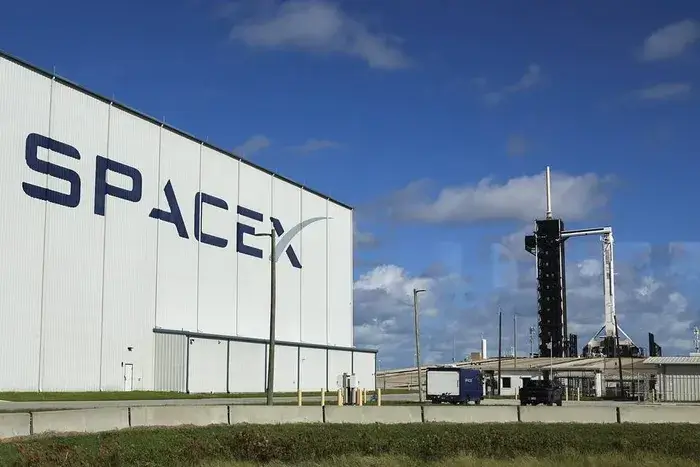
SpaceX, founded in 2002, is another pillar of Musk’s vision to make humanity a multi-planetary species.
The company has drastically reduced the cost of space travel, made space exploration more frequent, and is actively working toward Mars colonization.
But beyond these high-profile achievements, SpaceX has introduced groundbreaking technologies that will change how we view the universe.
Starship:
SpaceX’s Starship is designed for long-duration, interplanetary missions.
It’s the world’s first fully reusable spacecraft, and it is central to Musk’s goal of colonizing Mars.
The development of Starship is a key piece in making space travel more affordable and sustainable.
Starlink:
SpaceX’s Starlink project aims to provide global internet coverage by deploying thousands of small satellites into low Earth orbit.
The technology behind Starlink is revolutionary, providing high-speed internet in remote locations and creating a new model for global communication.
Nerd Angle – Reusable Rockets and Interplanetary Travel:
SpaceX has developed reusable rockets—the Falcon 9 and Falcon Heavy—which dramatically reduce the cost of launching satellites and cargo into space.
This rocket reusability is crucial for making space travel accessible and sustainable, and it’s a major leap toward interplanetary travel.
Neuralink: The Future of Human Augmentation

Neuralink, founded in 2016, focuses on developing brain-machine interfaces (BMIs) that enable direct communication between the human brain and computers.
The goal is to treat neurological conditions like Alzheimer’s and Parkinson’s, and eventually, enhance human cognitive abilities.
Neuralink’s work could change the way we interact with technology—and even with each other.
Brain-Computer Interfaces:
Neuralink is developing neurotechnological devices that could allow people to control computers, prosthetics, or even robots directly with their minds.
These innovations promise to restore lost sensory functions, offer new ways to communicate, and could eventually lead to human augmentation.
Nerd Angle – Ethical and Futuristic Implications:
Neuralink’s projects raise intriguing ethical questions about the future of humanity.
Could we someday upload our consciousness to a machine? How will these advancements affect our daily lives and social structures?
For the nerd community, Neuralink’s work is as thrilling as it is controversial.
The Boring Company: Digging Toward the Future
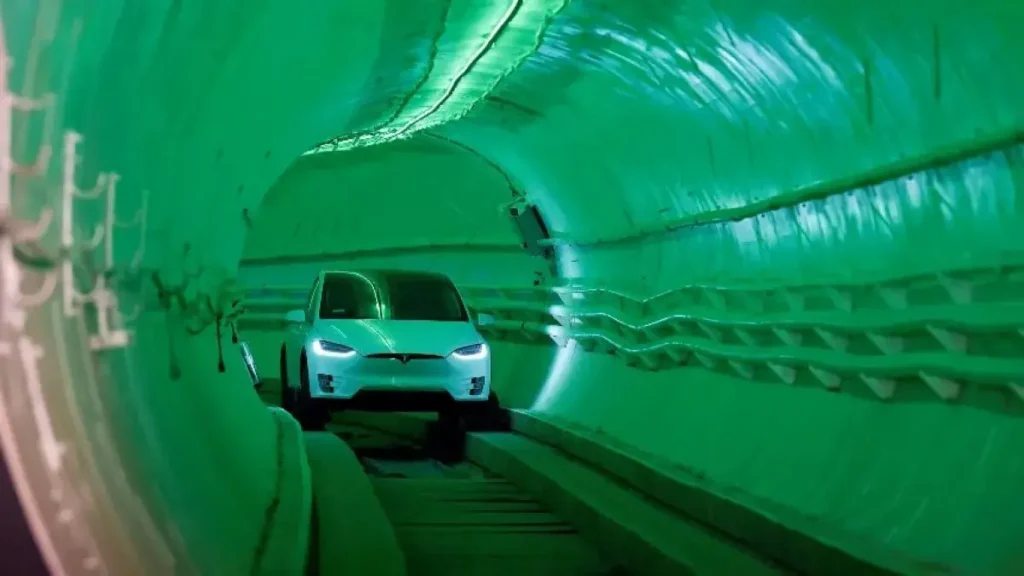
The Boring Company, founded in 2016, has a mission that might seem unconventional compared to Musk’s other ventures, but it’s just as groundbreaking.
The company is working on underground transportation solutions to solve the growing problem of urban congestion.
Underground Tunnels:
The concept behind The Boring Company is simple but revolutionary: build tunnels beneath cities to alleviate traffic congestion.
The company’s Loop and Hyperloop projects aim to create high-speed underground transportation networks, reducing travel times and creating a more efficient urban landscape.
Las Vegas Loop:
One of the most high-profile examples of this vision is the Las Vegas Loop, a transportation system that connects various locations in Las Vegas via tunnels and electric vehicles, bypassing traffic above ground.
Nerd Angle – Futuristic Transport Systems:
The nerd community, often captivated by sci-fi concepts of futuristic transport, is especially interested in The Boring Company’s Hyperloop—a vacuum tube that could carry passengers at speeds of up to 700 miles per hour.
The idea of underground tunnels transforming how we move around cities feels like something straight out of a futuristic dystopia.
Conclusion: Musk’s Master Plan Unfolding
Elon Musk’s companies are more than just businesses—they’re vehicles for transformation.
Whether it’s through Tesla’s push for sustainable energy, SpaceX’s bold exploration of outer space, Neuralink’s groundbreaking neural technologies
Or The Boring Company’s innovative approach to urban transportation, each company contributes to Musk’s overarching vision of a better, multi-planetary future.
For those in the nerd community, these companies represent the cutting edge of innovation, where science fiction is starting to become science fact.
As we continue to watch Musk’s ventures unfold, one thing is clear: he is not just building companies; he is changing the world.
5. What Makes Elon Musk’s Companies Unique?
Elon Musk’s companies stand apart not just for their groundbreaking innovations, but for the vision and values that underpin them.
From SpaceX’s audacious plans for Mars colonization to Tesla’s world-changing electric cars, Musk has consistently demonstrated a willingness to challenge the status quo.
So, what is it that makes his companies unique?
Innovation at the Core
At the heart of Musk’s businesses is innovation.
Tesla revolutionized the electric vehicle industry with cars that combine performance, sustainability, and cutting-edge technology.
SpaceX redefined space travel by creating reusable rockets, reducing costs and making interplanetary exploration seem more achievable than ever.
And then there’s Neuralink, working on brain-machine interfaces that could potentially augment human capabilities in ways we’ve only seen in sci-fi.
The ability to take bold, unproven ideas and turn them into reality is what separates Musk from traditional CEOs.
Where most companies follow the path of least resistance, Musk’s ventures push the boundaries of what’s possible, even when others say it can’t be done.
This relentless drive for disruptive innovation is what attracts nerds and tech enthusiasts who are constantly searching for the next big leap.
Risk-Taking and Bold Goals
One of Musk’s most defining traits is his willingness to take risks.
While many entrepreneurs might shy away from ventures with significant financial or technical hurdles, Musk embraces them head-on.
SpaceX was founded with the goal of reducing the cost of space travel, and for years, the company faced repeated failures—yet Musk’s belief in the project never wavered.
It wasn’t until SpaceX successfully landed the Falcon 9 rocket that the industry was forced to take notice.
Likewise, Tesla was met with skepticism in its early years.
The idea of electric cars that could compete with gasoline-powered ones seemed far-fetched.
Yet, Musk risked millions of his own money to keep Tesla afloat during its most challenging times.
His bold goals, like making electric vehicles mainstream and enabling humanity’s eventual colonization of Mars, are what make Musk such a unique figure in the tech world.
Nerds, who often dream of futuristic possibilities, find Musk’s unapologetic ambition deeply inspiring.
First Principles Thinking and Engineering Focus
Musk’s approach to problem-solving can be traced back to his use of first principles thinking—a strategy that breaks down complex problems into their most fundamental truths and builds solutions from the ground up.
For Musk, this means rethinking entire industries from scratch, rather than relying on the traditional, incremental methods.
For instance, when Tesla was designing its electric cars, Musk didn’t just improve on existing designs.
Instead, he took a deep look at the fundamental costs of electric vehicles and worked backward, creating solutions that significantly lowered production costs and allowed for better performance.
Similarly, SpaceX’s rocket reusability model came from first principles thinking.
Musk didn’t accept the traditional notion that rockets were one-time-use items; he asked, “Why can’t we reuse them?”
This engineering-focused mindset appeals directly to the nerd community, where the beauty of problem-solving and the thrill of creating something from scratch resonate deeply.
Nerds are often fascinated by engineering challenges, and Musk’s companies offer real-world examples of how creative thinking can solve even the most daunting technical problems.
A Vision for the Future Nerds Relate To
Musk’s ability to tie his work to a grand, almost futuristic vision is what truly resonates with nerds.
Whether it’s the dream of a multi-planetary future, where humanity spreads to Mars and beyond, or the vision of a sustainable energy future, Musk’s goals align with the ideals of many in the tech-savvy community.
His ventures are grounded in sci-fi-inspired possibilities, but he’s making them real, from AI and space exploration to clean energy and autonomous driving.
For nerds who grew up consuming comics, sci-fi movies, and tech blogs, Musk represents the possibility of turning science fiction into science fact.
His companies not only solve today’s problems but also build the infrastructure and technology for tomorrow’s possibilities.
The sense of being part of something greater—something that could change the course of history—is what draws nerds to Musk’s companies.
Musk’s companies are not just about creating products; they’re about reshaping entire industries and building a future that many only dreamed of in stories and movies.
This commitment to innovation, risk-taking, and an engineering mindset gives his ventures a unique edge in the tech world, attracting fans who are passionate about cutting-edge technologies and a future that’s out of this world.
Musk’s vision aligns with the dreams of the nerd community: a world driven by bold ideas, relentless ambition, and the pursuit of the extraordinary.
6. FAQs About Elon Musk’s Companies
How Many Companies Does Elon Musk Own?
Elon Musk is the mastermind behind several revolutionary companies, each aiming to transform different industries.
As of now, Musk owns and is involved in five major companies:
- Tesla, Inc. – Leading the charge in electric vehicles and sustainable energy.
- SpaceX – Revolutionizing space travel and pushing the limits of interplanetary exploration.
- Neuralink – Bridging the gap between the human brain and AI with cutting-edge technology.
- The Boring Company – Innovating underground transportation systems to ease urban congestion.
- Twitter (X.com) – Acquired in 2022, Musk has reshaped the social media landscape.
This diverse portfolio allows Musk to tackle everything from energy and transportation to space exploration and artificial intelligence.
His approach to owning these companies is not just about financial success, but about shaping a future where humanity can thrive sustainably and technologically.
Which Is Musk’s Most Successful Company?
While each of Musk’s companies is making significant strides, Tesla is widely regarded as his most successful venture in terms of market impact and valuation.
Tesla’s electric vehicles have not only changed the automotive industry but also spearheaded the push toward a greener, more sustainable future.
Tesla’s success is also marked by its innovative technologies, including autonomous driving and AI-powered vehicles, which resonate deeply with nerd culture.
This is no surprise—Tesla embodies the future Musk envisions, aligning with the tech world’s thirst for innovation and disruptive breakthroughs.
However, SpaceX has also made huge strides, especially with the successful launch and landing of reusable rockets, which have revolutionized space exploration.
Its Starship program and the potential for Mars colonization offer Musk another shot at leaving a lasting legacy in space.
Why Do Elon Musk’s Companies Attract So Much Media Attention?
Elon Musk’s companies don’t just attract attention because of their innovative technologies; they also spark controversy, speculation, and excitement across multiple industries.
Here’s why Musk’s ventures are constantly in the spotlight:
Ambitious, High-Impact Goals
Musk’s goal to colonize Mars with SpaceX, create a sustainable energy future with Tesla, and merge human brains with machines through Neuralink are both audacious and intriguing.
These larger-than-life goals naturally generate buzz, as they promise to change the world in ways that few others even dare to attempt.
Disruptive Innovation
Tesla’s electric cars, SpaceX’s reusable rockets, and Neuralink’s brain-machine interfaces are breakthroughs that challenge conventional wisdom.
When a billionaire with Musk’s profile pushes the envelope, it garners media attention and fuels public curiosity.
Musk’s Own Persona
Musk himself is a polarizing figure. His active presence on social media, frequent updates about his companies, and controversial statements add fuel to the fire.
People are fascinated by his outspoken nature and the way he handles public relations, which often leads to viral moments and media storms.
Appeal to Nerd Culture
Musk’s ventures are at the intersection of tech, science fiction, and futuristic innovation, all of which deeply resonate with the nerd community.
From AI advancements to space exploration, nerds are often the first to jump on the hype train, keeping the conversation about Musk’s companies alive on platforms like YouTube, Reddit, and Twitter.
Musk’s ability to make bold claims about the future and make them a reality is why his companies are so intriguing.
Whether it’s the promise of a multi-planetary civilization or a sustainable energy future, his ventures consistently keep the public’s attention.
7. Conclusion: The Future of Elon Musk’s Companies
Elon Musk’s companies have already made significant contributions to a wide range of industries, from electric vehicles with Tesla to the future of space travel with SpaceX.
His ventures are reshaping the very fabric of technology, sustainability, and human progress.
Looking ahead, the impact of Musk’s companies will only continue to expand.
The Mars colonization plans by SpaceX are still in the early stages but could pave the way for a multi-planetary civilization, forever altering humanity’s future.
Tesla’s Full Self-Driving (FSD) technology is set to revolutionize transportation, making cars smarter and more autonomous.
Neuralink is pushing the boundaries of human potential by integrating brain-computer interfaces, which could change the way we interact with technology forever.
Each of Musk’s companies is driven by a singular vision of innovation and sustainability, and with his relentless pursuit of bold goals, there’s no telling how far these ventures will go.
Whether it’s sustainable energy solutions, colonizing other planets, or transforming human capabilities, Musk’s companies continue to hold the attention of the tech community and beyond.
So, as you follow his incredible journey, we want to know: Which of Elon Musk’s companies excites you the most?
Whether it’s the revolutionary electric cars, the exploration of Mars, or the groundbreaking brain-machine interfaces, we’d love to hear your thoughts.
Let us know in the comments below! What do you think the future holds for these game-changing companies?
And feel free to read the latest articles on our blog.
Follow our social media to receive content as soon as it is released.👇

